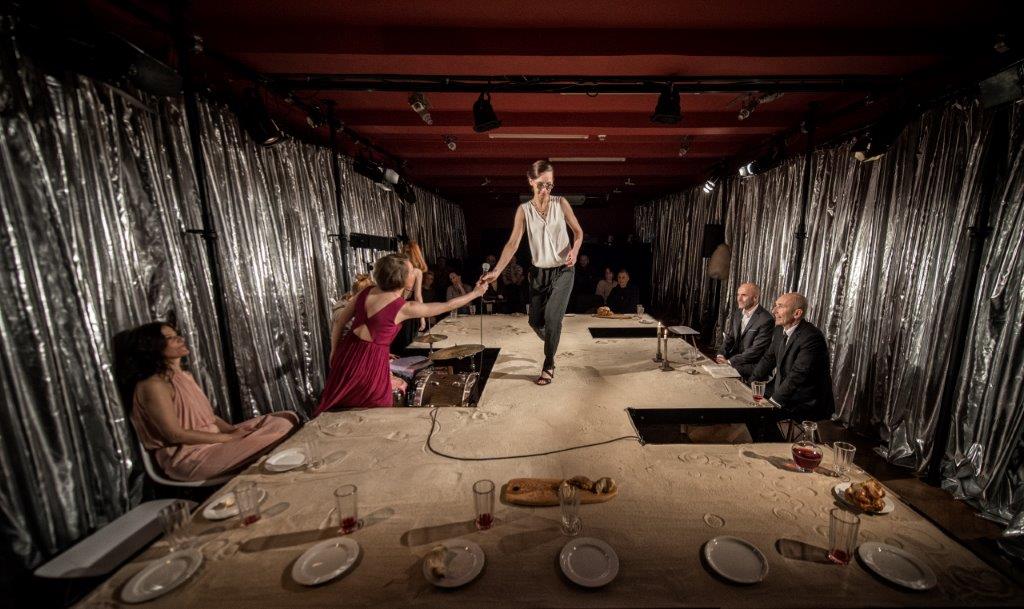Events
Estera, Rachel and Ida Kamińska Jewish Theatre in WarsawJewish Actors
Anna Smolar
Author f the text and dramaturgMichał Buszewicz
CastRyszard Kluge
Mariola Kuźnik
Joanna Rzączyńska
Izabella Rzeszowska
Małgorzata Trybalska
Jerzy Walczak
29.05.2015
LanguagePolish with English subtitles
One of the best-known Polish plays of recent times, it may also classify as one of the most personal projects in the history of Polish theatre. And one of the most honest. The play is set during a Shabbas supper, but this time there will be little room for tradition, jesting and nostalgia. This will instead be an insightful tale about what it means to be a Jewish actor in a Jewish theatre in the Poland of today. And what theatrical life really looks like behind the scenes. It tells the story of a company based in the centre of Warsaw, trying for over half a century to sustain memory of a community which has vanished from the city. The play focuses on both the emancipation of an actor from the company and the need to be part of a team. Even though the group of actors on stage talk about the realities of life and work in their theatre, as is often the case with great plays it in fact turns out to be about much more than that.
The artists about their play:
At the start of the play “Jewish Actors” there is a conversation. A meeting with various people who belong to a community which is more numerous than the number of representatives up on stage, discovering their life histories, early careers, artistic development, successes and responses of those around them regarding the path they took in life. And yet it would be wrong for us to conclude that this show, inspired by interviews with actors from the Jewish Theatre, are only about their own feelings and opinions. Equally, it presents voices of observers who are somehow connected with the field in question, their surprise, fascination, attempts at solving the puzzles which appear when they try to get to know another. Perhaps that is why we have taken on the attempt to present this portrait in the form of a “mockumentary” – a genre which seems to be a documentary, and yet does not promise to deliver real-life aspects of the events within. Actors, using their real names, turn them into the names of their characters, which can then be filled with narratives based both on their own autobiographical experiences, as well as the experiences of their colleagues or even completely imaginary tales. Hence the various inconsistencies we hear from the actors, especially during the “confessional” sections of the Shabbas dinner. Watching the actors from the Jewish Theatre, in order to talk about them allows the viewers of “Jewish Actors” to notice that this particular group has a lot in common with other, much broader communities, very often set in direct contrast with the terminology used to label them. Perhaps it is in the details that one discovers a way to attain universality. During one of these conversations, someone observed: “Actually, this is a show about shame”. One could add: “Yes, about shame, but about pride too.”
Having attracted attention and praise from theatre critics, including several awards, the play has been staged at the following festivals: Festival of New Dramaturgies in Bydgoszcz, The Festival of New Theatre in Rzeszów, and the Divine Comedy Festival in Krakow.
Set design and costumes
Anna Met
Live music
Dominika Korzeniecka
Assistant director
Paulina Lombarowicz
Awards:
Michał Buszewicz received the Young Artist Award at the 54th edition of the Rzeszów Theatrical Encounters – Festival of New Theatre.
It also received the Main Jury Prize as the best play at the 51st Small Theatre Forms Festival in Szczecin and the Actors’ Award at the 56th Kalisz Theatrical Encounters.

